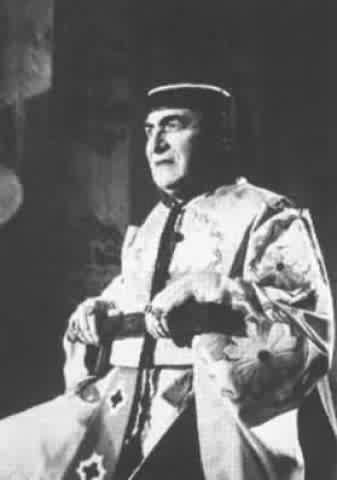|
|
|
 |
Laugh, it is said, and the world laughs with you. But when the Mikado laughs - we want to know who, why and when. So we have a mystery, fellow Savoyards. A "whodunnit" not by Agatha Christie or Ian Fleming, but a mystery just the same.
Well, I was certain I knew (and until recently on insufficient evidence to he sure) that Darrell Fancourt introduced the macabre touch in the famous song.
It was a conversation many, many years ago that led me to my conclusion. The conversation was with that delightful and charming veteran of the Savoy, Sir Henry Lytton. He was "mister" then.
We met between the acts of "The Pirates of Penzance" in 1929 during the first D'Oyly Carte visit to Chicago. I commented to Mr. Lytton on Fancourt's very melodramatic interpretation of the Pirate King. He smiled and said quite gently, "It's not the way Mr. Gilbert intended, I'm sure. The King should be a story book pirate, not a real one and blood thirsty to boot. But that's the way Mr. Fancourt plays it, so-" He shrugged his shoulders and smiled again.
The stage manager called "Curtain." I said good-bye and never again saw or talked to him.
But in subsequent years, I became more aware of the Fancourt style, for I saw him in every part he played, except Sir Marmaduke. All the roles were endowed with that Fancourtian melodramatic flourish which was his hall-mark - none genuine without it. Like sterling on silver.
The "laugh" question surfaced only in recent years. At once, said to myself said I, "Darrell Fancourt, of course."
Now it turns out that I was right but my reason was wrong. I found this out at the Centenary in 1975 during a conversation with the highly knowledgeable Frederic Lloyd. Somehow or other our conversation drifted to Darrell Fancourt and Fred Lloyd told me this:
It was spring of 1920. Fred Hobbs, who played the Mikado roles, was leaving the company. (He later returned as company manager.) Mr. Rupert D'Oyly Carte and J. M. Gordon his stage director were seeking a replacement. Fancourt having been suggested, Carte and Gordon called on him to discuss a possible engagement.
Much to their surprise they found that the singer had never witnessed a Gilbert and Sullivan performance. So they sent him over to the theatre to see "The Mikado".
Several days later the three met again at Fancourt's hotel. He was delighted with the production and felt sure he could do the part. "But one thing bothered me," he said. "In that glorious song, just before 'My object all sub- lime,' the singer stopped and went into a series of eerie arm, hand and body movements. It looked something like an incantation or more likely a lament. It offended me because it was similar to the ugly movements I had seen per- formed by the character Fagin in 'Oliver Twist'"
"Mr. Carte," he continued, "I must tell you my background is Jewish. Fancourt is a stage name. My real one is David Levinson. I just couldn't go through those movements, it would bother me."
The Savoy duo were impressed. They suggested that Fancourt come up, if he could, with a substitute piece of business.
"I already have an idea," smiled Fancourt. Without an accompaniment he started the song. Finishing the words "Parliamentary trains" he spread his arms wide, raised his head, took a deep breath and then burst into a fiendish laugh. It was piercing. It was weird - humorous and lingering. It ended with a wild intake of breath and then an almost pianissimo, "My object all sublime" The laugh was contagious. The contrast between it and the music that followed was scene-stopping.
Carte and Gordon were delighted. The innovation was fantastic. Fancourt was engaged, He opened in The Mikado and the laugh was applauded by an enthusiastic audience. The rest is history.
| Artist Index | Main Index |